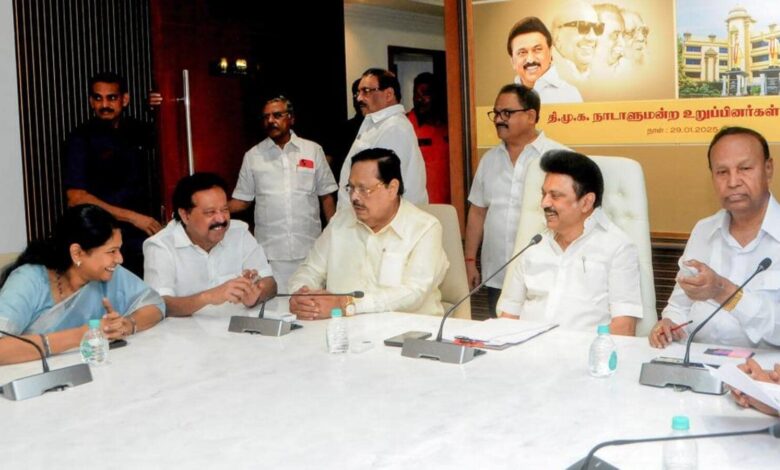DMK Advocates for 'Code of Conduct' for Governors to Streamline State Governance
Chennai, Tamil Nadu – The Dravida Munnetra Kazhagam (DMK), under the leadership of Chief Minister M.K. Stalin, has taken a decisive step to address concerns regarding the conduct and responsibilities of state governors. In a meeting held at the party headquarters in Chennai, the DMK passed a resolution urging the Union Government to establish a comprehensive 'Code of Conduct' for governors. This proposed code aims to delineate clear guidelines and set specific time frames for governors to act upon files and bills forwarded by state governments.

Background and Rationale
The DMK’s resolution emerges from a series of events that have highlighted tensions between the Tamil Nadu state government and the Governor’s office. Notably, Governor R.N. Ravi has, for the third consecutive year, departed from the traditional practice of delivering the customary address at the commencement of the legislative assembly session. This deviation has been perceived by the DMK as a disregard for established protocols and an impediment to the legislative process.
The resolution articulates concerns over the Governor’s actions, stating: “He is the constitutional head of the state but does not respect the tradition of the House, he shelves the bills passed by the Assembly, he belittles the Tamil Thai Vazhthu (state anthem) but he sings paeans for Sanskrit and Hindi.” Furthermore, it accuses the Governor of acting akin to an opposition leader and engaging in confrontational behavior that has left several state universities without leadership, while simultaneously promoting the ideals of the Bharatiya Janata Party (BJP) at these institutions.
Objectives of the Proposed ‘Code of Conduct’
The DMK’s call for a ‘Code of Conduct’ seeks to achieve several key objectives:
- Establish Clear Protocols: Define the roles and responsibilities of governors to prevent overreach and ensure adherence to constitutional mandates.
- Ensure Timely Decision-Making: Implement specific time frames within which governors must act on files and bills submitted by state governments, thereby preventing administrative delays.
- Promote Respect for State Traditions: Mandate governors to honor state customs and practices, fostering harmony between the state’s executive and ceremonial heads.
- Prevent Partisan Activities: Prohibit governors from engaging in activities that may be perceived as politically biased, ensuring the impartiality of the office.
Additional Resolutions and Future Actions
In addition to advocating for the ‘Code of Conduct’, the DMK meeting resulted in the passage of five other resolutions:
- Archaeological Recognition: Urging the Union Government to acknowledge and promote the state’s recent archaeological findings, which suggest that the Iron Age began in Tamil Nadu.
- Environmental Conservation: Expressing gratitude to the state government for successfully persuading the Union Government to cancel the proposed tungsten auction in Madurai district, thereby protecting local ecosystems.
- Educational Autonomy: Calling upon the BJP-led Union Government to withdraw the draft University Grants Commission (UGC) regulations, which the DMK perceives as encroaching upon state rights in higher education.
- Federalism and State Rights: Reaffirming the party’s commitment to federal principles and opposing any central policies that undermine state autonomy.
- Social Justice Initiatives: Advocating for the implementation of policies that promote social equity and protect the rights of marginalized communities within the state.
The DMK plans to raise these issues during the forthcoming parliamentary budget session, seeking to engage with the Union Government and other political entities to garner support for their initiatives.
Implications and Reactions
The DMK’s proposal has sparked a broader conversation about the role of governors in India’s federal structure. Proponents argue that a defined ‘Code of Conduct’ would enhance clarity, prevent potential conflicts, and uphold the sanctity of state institutions. Critics, however, caution that such measures must be carefully crafted to respect the constitutional balance of power and avoid undermining the governor’s authority.
As the debate unfolds, the DMK’s resolutions underscore the party’s commitment to preserving state rights and ensuring that gubernatorial actions align with the interests and traditions of the people of Tamil Nadu.





